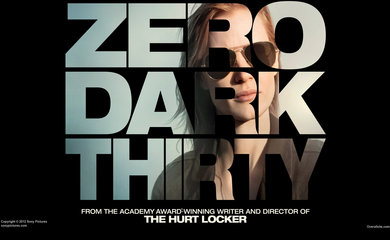We know the images–the screams, that desperate radio chatter on September 11th 2001, those blazing towers might well have been upended battleships from Pearl Harbour. It was a call to war that America answered, a revenge far reaching, never ending. It was a slow decline, a haemorrhaging of money and resources. The violent death of a Super-Power in a decade of war that still rages today in Mali and Algeria. We know the images and that is why Kathryn Bigelow keeps them behind a dark screen.
“Zero Dark Thirty” is a military term for the night. It might be 12.30am but the title evokes the Stygian abyss, the pure black of combat, and the finite act of killing. It might be the September 11th attacks or the invasions of Afghanistan and Iraq. It might be the endless, ceaseless reports of dead servicemen and women or the nameless, countless civilians who have lost their lives in the crossfire. It could be an acronym, ZDT used to describe the haunted CIA agents who stalk the ghost of Osama bin Laden across the Middle East.
Jessica Chastain’s chilly Maya doesn’t know it yet but that’s how she will end up as she watches Dan, a complex performance from Jason Clarke, debase and torture terrorist suspects in Pakistan. She’s a rookie wearing her best black suit to her first interrogation. “He has to learn how helpless he is,” Dan explains to Maya. Later he offers his victim, “an email for a blanket and some solid food.”
These scenes of torture are gruelling and extended, inferior to the silent montage in “The Battle of Algiers” In that film Colonel Mathieu constantly confronts the world’s journalists over his Paratroopers methods, “Should we remain in Algeria? If you answer ‘yes,’ then you must accept all the necessary consequences.” Torture is clearly a means to an end for Dan and his masked henchman but Bigelow’s characters clearly struggle internally with their dubious techniques, but does the end ever justify the means?
When that end is the killing of Osama bin Laden the depths of your morality are sorely tested. This is the hate figure of a nation, the first super villain of the 21st Century, a man that stands next to Hitler, Stalin and Saddam Hussein in his infamy. A quasi-myth referred to as, “one of the disappeared ones.” Maya has only ever had eyes for bin Laden; he is an obsession that is sucking the life from her one torture and false lead at a time. Maya’s silhouette is the pale shadow of Kathryn Bigelow, gradually dissolving into a vampire from her cult film “Near Dark.”
She is the unlikely retribution of the United States of America, a flame-haired Boadicea, the one constant in an ever-changing sea of personnel. As a detective Maya is ruthless and calculated, when her contemporaries are killed or burnt out she continues in her pursuit of a nation’s vengeance, “I believe I was spared so I can finish the job.” Is she the embodiment of Bush’s evangelical zeal or Obama’s detached intellectualism?
When CIA operatives are killed by a suicide bomb Maya is both, “I’m gonna smoke everybody on that op and then I’m gonna kill bin Laden.” It’s a statement of fact not a hyperbolic explosion and that is what makes Maya so fascinating and so frightening. The product of an organisation that needs an end game to justify the shabby industry of torture, the infrastructure of lies and deceit that stretches across the globe in so called Black-Sites. Dan returns to Washington spent and exhausted because he has, “seen too many guys naked.”
Maya doesn’t blink at the flesh and faces down hit squads and CIA top brass alike. Her intelligence eventually point to the iconic compound in Pakistan and her 100% certainty that bin Laden is hiding in plain sight rather than cowering a cave somewhere in Afghanistan. She can’t pull the trigger directly so hands her precious baby over to a hulking SEAL team. Like a mother waiting for her child to come back from their first day at school she is apprehensive, jealous and a tad bitter.
Bigelow’s staging of the SEAL’s assault is anti-climatic, a clinical massacre under the nose of a supposed ally. In many ways bin Laden’s death is a footnote, a hollow victory for an exhausted country. When Maya embarks on a Cyclopean C-130 as the only passenger her world as she has known it has finished. What do you do after the only man you have ever thought about leaves you? What other individual would ever come close? Is Maya like Joan of Arc to be sacrificed by her country now she has outlived her usefulness? Does the end ever justify the means?

